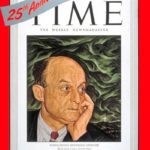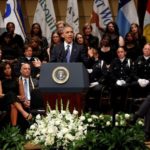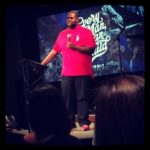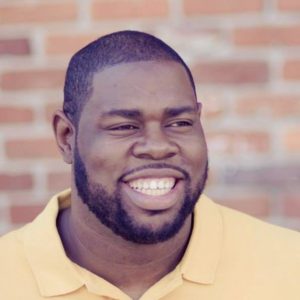He dropped the mic.
Charlie Mitchell was called “The Prez” during our class. His comments were always thoughtful, intellectually stimulating, and culturally compassionate.
 I remember a number of times Charlie would stand, pace back-and-forth delivering a point, then, with an empty water bottle as a microphone, drop the mic as an exclamation point, conveying his final sentence on whatever statement he was making that day. Charlie’s classmates and I would respond in rolling fits of laughter. Charlie would sit down, a smile on his face.
I remember a number of times Charlie would stand, pace back-and-forth delivering a point, then, with an empty water bottle as a microphone, drop the mic as an exclamation point, conveying his final sentence on whatever statement he was making that day. Charlie’s classmates and I would respond in rolling fits of laughter. Charlie would sit down, a smile on his face.
 Charlie’s smile, it should be noted, is a city block wide and brings light to any room. Charlie Mitchell’s persona is winsome and winning. His points of view are immediately considered important by all who hear him. Articulate, cogent ideas delivered in carefully wrapped words begin to eliminate potential disagreements.
Charlie’s smile, it should be noted, is a city block wide and brings light to any room. Charlie Mitchell’s persona is winsome and winning. His points of view are immediately considered important by all who hear him. Articulate, cogent ideas delivered in carefully wrapped words begin to eliminate potential disagreements.
Charlie’s delivery matches his desire. “I want to be a public theologian.”
 The pronouncement came in our December 2014 class. “I want to learn to speak so that everyone will listen: conservatives, liberals, Democrats, Republicans, Blacks, Whites, politicians, and people.”
The pronouncement came in our December 2014 class. “I want to learn to speak so that everyone will listen: conservatives, liberals, Democrats, Republicans, Blacks, Whites, politicians, and people.”
His comment was a response to my question, “So what do you want to do with the knowledge you’ve gained?”
 After hearing the phrase “public theologian” I smiled and asked the class if they had ever heard of Reinhold Niebuhr. In the 1950’s Niebuhr graced the front cover of TIME magazine as “America’s Theologian.” Niebuhr’s ideas crossed every dividing line, his vocabulary was accessible to all.
After hearing the phrase “public theologian” I smiled and asked the class if they had ever heard of Reinhold Niebuhr. In the 1950’s Niebuhr graced the front cover of TIME magazine as “America’s Theologian.” Niebuhr’s ideas crossed every dividing line, his vocabulary was accessible to all.
Ever since the classroom exchange, Charlie and I have been emailing, texting, and messaging about how one practices the craft of being a public theologian. Charlie’s hash-tag for his ministry in Baltimore #baltimorelivesmatter is itself a Niebuhrian, boundary-crossing statement.
 The first week of July 2016 called again for the need of a theologian to speak publicly. Two Black men in Louisiana and Minneapolis had been killed by White police officers. Then one Black man killed five White police officers in Dallas. It was a week of tumult and rage.
The first week of July 2016 called again for the need of a theologian to speak publicly. Two Black men in Louisiana and Minneapolis had been killed by White police officers. Then one Black man killed five White police officers in Dallas. It was a week of tumult and rage.
In light of that week’s events I was in regular contact with Charlie once more. The question was being posed everywhere: “What do we say?”
 I told Charlie that I was developing an essay based around his desire to be a public theologian. But this time I was amplifying a more directed essay: “Social Media Etiquette as a Public Theologian.” The furious pace of information coming from Facebook, Twitter, Instagram, and the like seems to overwhelm a reasoned and reasonable response to any given situation.
I told Charlie that I was developing an essay based around his desire to be a public theologian. But this time I was amplifying a more directed essay: “Social Media Etiquette as a Public Theologian.” The furious pace of information coming from Facebook, Twitter, Instagram, and the like seems to overwhelm a reasoned and reasonable response to any given situation.
What follows is a partial list of five statements and five questions that might begin the process of slowing our words to match the speed of electronic information which barrage the public, necessitating the interpretation of a theologian.
- Timing. WHEN something is said may matter more than WHAT is said.
- Approach. HOW something is said may matter more than WHY something is said.
- Mindset. Attitude moves through words. The tenor of our words in response to one event should match the ardor of our words in similar events. In so doing we will lessen the opportunity by our adversaries to question our intentions.
- Institutions. All associations are made up of individuals, both of which are corrupted and corruptible.
- Ideas. Change happens when ideas take root in peoples’ minds and then take place in the public eye.
- Group. Am I trying to please a certain constituency or careful to tell the truth?
- News. Do I allow headlines from certain media to drive my interpretation of events?
- Research. Does the immediacy of social media mean I respond with facts or opinions?
- Reassessment. Is my initial perspective of any person or event ever reevaluated?
- Source. Is my viewpoint driven by cultural or biblical dictates?
 Support Charlie in his work in Baltimore.
Support Charlie in his work in Baltimore.
Encourage Charlie via social media.
Cheer Charlie on before The Throne of Grace that The Spirit would continue to develop Charlie’s platform as a public theologian.
The events in Minneapolis, Baton Rouge, Dallas, and again Baton Rouge are horrific. The response from Christians everywhere is to lament, pray, and press for justice with peace. Social media is often filled with hate-filled words. How Christians respond on social media demands a loving etiquette so that our words reflect care for our fellows because of Christ’s love for us. Our class was held at Spanish River Church in Boca Raton, Florida where my friend Dr. Tommy Kiedis leads the M.A. program for Capital Seminary & Graduate School. Dr. Mark Eckel is president of The Comenius Institute. This essay will appear in Mark’s forthcoming book Up Against the Lockers: Teaching-Learning as Christian Practice.


Good words about a good man doing good work for our good God. Thanks Mark. “Social Media Etiquette” is gold. Charlie, may your tribe increase. Grateful for the gifts and power of Jesus evident in and through your life.
Amen Tommy! Charlie, every time I hear your name – I smile! I may not know you personally, but I know OF you and your work and your desire to share Jesus. I add my prayer with so much appreciation for who you are and your call to the “public square”!
Good stuff!!
Thank you for the essay, Dr. Eckel. The 5 statements and 5 questions could be used almost as a self-assessment for the quality of our posts and responses on social media.
God is working thru my cousin, Charlie Mitchell